User:Hans/Examples2
Basic formatting
Section headings
| You type | You get |
|---|---|
== Level 2 ==
=== Level 3 ===
==== Level 4 ====
===== Level 5 =====
====== Level 6 ======
|
Level 2Level 3Level 4Level 5Level 6 |
Section headings define the structure of the page and is used to generate the Table of Contents. They are created by putting two or more = characters at each end of the section heading.
Paragraphs and newlines
| You type | You get |
|---|---|
This is a paragraph.
This belongs to the same paragraph.
This starts a new paragraph.
You can manually insert a newline like this. <br />
Use this feature sparingly.
|
This is a paragraph. This belongs to the same paragraph. This starts a new paragraph. You can manually insert a newline like this. |
Paragraphs are created by separating two blocks of text with at least one empty line.
Text formatting
| You type | You get |
|---|---|
'''Bold text'''
|
Bold text |
''Italic text''
|
Italic text |
''Bold and italic text''
|
Bold and italic text |
See Typographical Guidelines for more information about when to use what.
Lists
| Description | You type | You get |
|---|---|---|
| Bulleted lists | * One
* Two
** Two point one
* Three
|
|
| Numbered lists | # One
# Two
## Two point one
# Three
|
|
| Combined bulleted and numbered lists | * One
* Two
*# Two point one
* Three
|
|
| Definition lists | ;item 1
: definition 1
;item 2
: definition 2-1
: definition 2-2
|
|
Indenting text
| You type | You get |
|---|---|
No indent (normal)
:First indent
|
No indent (normal)
|
Escape wiki markup
| You type | You get |
|---|---|
To make '''bold text''',
use <nowiki>'''bold text'''</nowiki>
|
To make bold text, use '''bold text''' |
Sometimes it is useful to not apply the wiki markup, for example when you want to demonstrate how to use the markup. In such cases you can put <nowiki> and </nowiki> between the text that should remain unformatted.
Common elements
Links
| Description | You type | You get |
|---|---|---|
| Internal links | [[Special:myLanguage/Dolphin|Dolphin]]
|
Dolphin |
| Links with custom text | [[Special:myLanguage/Dolphin|Custom text]]
|
Custom text |
| External links | [http://kde.org An external link]
|
An external link |
Images
A single centered image
text text text text text text text text text text text text text text text text text text text text text text text text text text text text text text text text text text text text text text text text
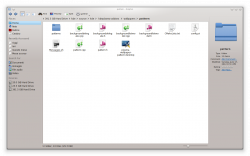
text text text text text text text text text text text text text text text text text text text text text text text text text text text text text text text text text text text text text text text text
Thumbnail with caption
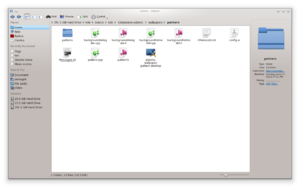
text text text text text text text text text text text text text text text text text text text text text text text text text text text text text text text text text text text text text text text text text text text text text text text text text text text text text text text text text text text text text text text text text text text text text text text text text text text text text text text text text text text text text text text text text text text text text text text text text text text text text text text text text text text text text text text text text text text text text text text text text text text text text text text text text text text text text text text text text text text text text text text text text text text text text text text text text text text text text text text text
Multiple images in a grid
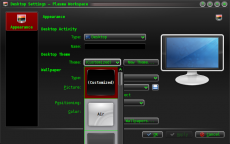 |
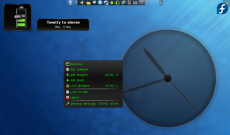 |
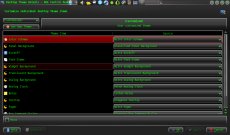 |
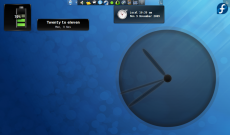 |
More examples
More detailed examples can be found on http://www.mediawiki.org/wiki/Help:Images.
Icons
| You type | You get |
|---|---|
Click on {{Icon|plasma}} to open the desktop Tool Box.
|
Click on |
The best way to refer to icons in the GUI is to display the icon in the text. The argument (in the example above plasma) is the same as the icon name that icon themes use.
If the icon does not exist, it has to be uploaded to the wiki:
- The icons can often be found locally in the directory usr/share/icons/oxygen/
- Find the icon image file, preferably in 16x16 px
- Copy the image file to your home directory and add Icon- in front of the filename. The rest of the filename should remain the same, so for example plasma.png would be Icon-plasma.png
- Upload the icon to UserBase. See Update an Image for more information about how to upload images
Code
| You type | You get |
|---|---|
Here is some <code>code</code> in running text.
|
Here is some code in running text.
|
| You type |
|---|
{{Input|1=<nowiki>
The code in this box is input by the user
Indent with whitespace
</nowiki>}}
|
| You get |
The code in this box is input by the user
Indent with whitespace
|
| You type |
|---|
{{Output|1=<nowiki>
This is some output the user would read from e.g. Konsole
It works in a similar way as the input box above
</nowiki>}}
|
| You get |
This is some output the user would read from e.g. Konsole It works in a similar way as the input box above |
| You type |
|---|
{{Input|<syntaxhighlight lang="php" line>
# The input and output box also support syntax highlighting
# This is useful for displaying source code, in this example some PHP code
# Initialise common code
$preIP = dirname( __FILE__ );
require_once( "$preIP/includes/WebStart.php" );
</syntaxhighlight>}}
|
| You get |
'"`UNIQ--syntaxhighlight-00000043-QINU`"'
|
Quotes
| You type | You get |
|---|---|
<blockquote>This is a quote from another page</blockquote>
|
|
Information, Note, Tip and Warning box
| You type | You get |
|---|---|
{{Info|This is general information}}
|
|
{{Note|Some important information to note}}
|
|
{{Tip|A helpful piece of advice}}
|
|
{{Warning|Something that can be dangerous}}
|
Where the strongest possible warning is needed, the Remember box can be used, but please use sparingly.
| You type | You get |
|---|---|
|{{Remember|1=Important thing to remember}}
|
Special text
Dates
| You type | You get |
|---|---|
18 Mar 2011
|
18 Mar 2011 |
Dates in a purely numerical format cause confusion, due to differences in expectations of geographical zones. Please spell out the month completely or in abbreviated form (first three letters), and the year is in 4-digit format. The day may be single or double-digit.
Keyboard keys and shortcuts
| You type | You get |
|---|---|
Press <keycap>Enter</keycap>
|
Press Enter |
<keycap>Alt + Shift + E</keycap>
|
Alt + Shift + E |
Menus and sequence of choices?
A sequence of menu choices should look like this:
Other sequences have a similar look, for example
Filenames and paths
This is an example of a filename: some_file.txt
A path is written in a similar way: ~/some/path/
Application pages
Application screenshot and description
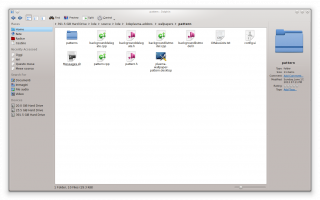 |
The dedicated file manager focusing on usability |
KDE3 and KDE SC 4 versions
![]() If you write about the KDE3 version of an application, you should use this icon.
If you write about the KDE3 version of an application, you should use this icon.
![]() If information about the KDE SC 4 version appears an the same page, you can use this icon.
If information about the KDE SC 4 version appears an the same page, you can use this icon.
Community applications
For community applications not distributed as core KDE applications, add {{Community-app}} to the bottom of the page. It shows up like this:





